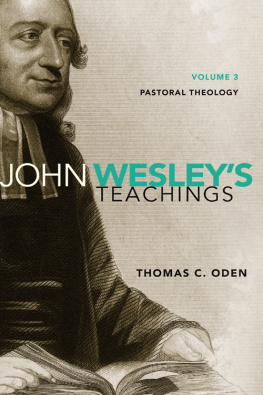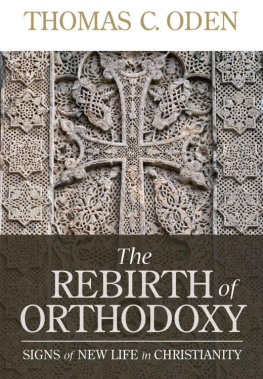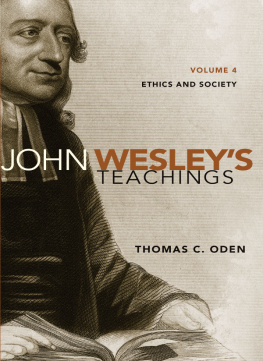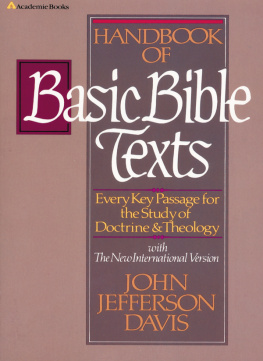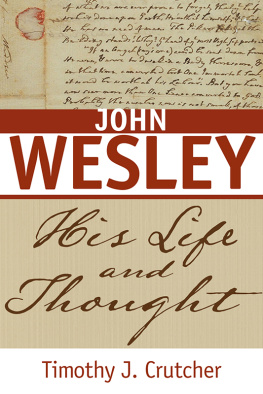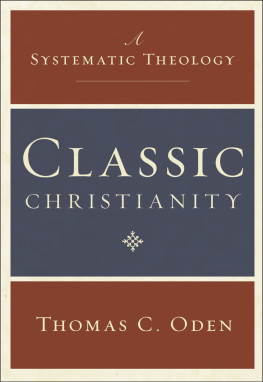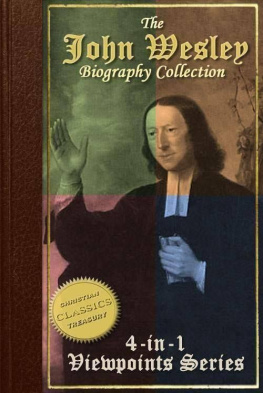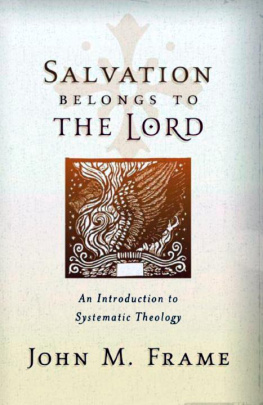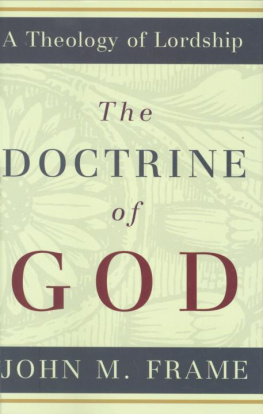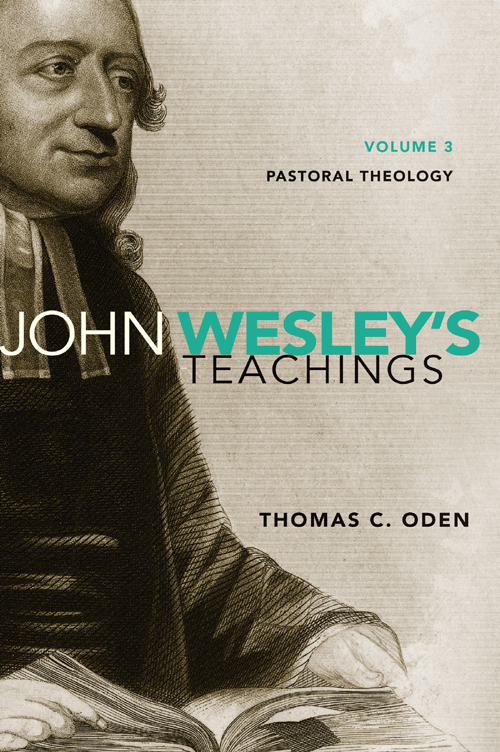THOMAS C. ODEN
Tolerance for varied opinions is a prominent feature of Wesleys view of teaching. He wrote:
Condemn no man for not thinking as you think: Let every one enjoy the full and free liberty of thinking for himself: Let every man use his own judgment, since every man must give an account of himself to God. Abhor every approach, in any kind or degree, to the spirit of persecution. If you cannot reason or persuade a man into the truth, never attempt to force him into it. If love will not compel him to come in, leave him to God, the Judge of all.
The Series
This series provides a readers guide to John Wesleys teaching. This volume continues the sequence begun in volume 1, Wesleys teaching on God and providence, and volume 2 on Christ and salvation.
In this volume, I focus on the basic tenets of Wesleys evangelical teaching on the church, ministry, and pastoral care. This includes his writings on the call to ministry, discipleship, pastoral leadership, soul care, baptism, and the Lords Supper. My goal is to convey in the most concise way the core argument of all major and most minor texts of John Wesley.
The method of all four volumes remains the same: close adherence to the primary source texts of John Wesley organized in a systematic sequence. I have tried to hold close to the text itself in Wesleys own plain-spoken writings, and to convey its meaning in contemporary language.
My aim is to introduce Wesleys teaching to evangelical, orthodox, and Catholic readers who have never met him. Many believers in Wesleys connection in the past century have never been given an opportunity to read him in depth or to be intellectually formed by his fertile mind. Nevertheless, millions of believers over the last two and a half centuries have worshiped in faith communities shaped by his remarkable ministry.
This Volume
With this volume, I seek to deliver to nonprofessional readers the gist of Wesleys teaching on the church and pastoral care. Wesley delved deeply into biblical teachings on the nature of the church, the pastoral office, its ministries of preaching and worship, and outreach to ordinary folk who long to share in life in Christ. His writings on pastoral counsel include teaching homilies on marriage, children, care for families, care for singles, and care for the sick and dying.
While this volume is not comprehensive, it includes core insights from all of these varied types of literature: essays, hymns, homilies, and prayers. My purpose is not to explore every aspect of a given writing or to unpack differences in its interpretation or to try to solve all of the texts implications. Rather, my purpose is to show in each text the heart of Wesleys argument, his intention, and his relevance for today. If we track carefully Wesleys own writings on church, ministry, and pastoral care, we will find ourselves reviewing the full range of issues normally discussed in pastoral theology today.
The Body of Work
Wesley was a relentless writer, an avid diarist, a traveling preacher constantly on the move, and a public figure for six decades. He left behind him a huge body of work. This includes 151 teaching homilies, six decades of daily journals (173591) and manuscript diaries, and eight volumes of his letters, plus many miscellaneous essays, Scripture studies, doctrinal tracts, and occasional writings.
From this massive literature, I have gleaned Wesleys ideas, thinking, and teaching on the care of souls. And I have sought to condense these for modern readers into understandable and usable segments fit for meditation, preaching, and theological study. Much of Wesleys instruction applies to todays social conditions. The legacy of these writings is immense. The heritage is priceless.
In his address to readers of his collected works of 1771, Wesley sought to organize his teaching homilies into a naturally unfolding sequence: I wanted to methodize these tracts, to range them under proper heads, placing those together which were on similar subjects, and in such order that one might illustrate another. Many of these homilies focused on pastoral theology, challenges in the practice of ministry, and care of souls. This is the systematic design we will build upon.
It is impossible to detach Wesleys pastoral care from his teachings on God, Christ, salvation, and the work of the Spirit. Pastoral care is like an extended footnote to his teaching of salvation. Those who pick up this volume alone and wonder about his view of scriptural authority do well to go back to volume 1 where that is fully discussed. Others will consult volume 2 for more detailed expositions on atonement, faith, assurance, grace, election, and predestination.
The Order of Topics
In his Preface to the Third Edition of 1771, Wesley concisely stated his desire to serve ordinary readers who sought to grasp an overall perspective on his work: he sought to arrange his writings under proper heads, locate similar subjects together, and allow one to illustrate another. Looking over his whole body of work, Wesley mused that there is scarce any subject of importance, either in practical or controversial divinity, which is not treated of more or less, either professionally or occasionally in this body of practical divinity.
Wesleys works are largely written for laypersons. He deals with issues commonly discussed today on the nature and mission of the church, its laity, and its clergy and their calling and preparation for gospel ministry, counsel, care, and admonition. The homilies on these subjects are supplemented here by the occasional treatises, journal references, and letters on these subjects that are spread widely apart. As far as possible, I have followed Wesleys own pattern in unfolding the logical order of subjects dealing with church and ministry and key topics of pastoral theology.
Defining Pastoral Theology
Pastoral theology is the branch of theology concerned with the study of God within the context of the ministry of the clergy and the ministry of lay believers. Pastoral theology seeks to give practical expression to life with God. It is often considered to be the more down-to-earth part of theology, more pragmatic than speculative, and intended for the equipping of ministers, clergy and lay. Its subtopics ordinarily include all the topics of our table of contents: the church, the office and gifts of ministry, homiletics, pastoral care, liturgics, and church leadership and the applications of doctrinal and moral theology. Pastoral theology teaches the gifts and tasks of the ministers of Christ, and stewards of the mysteries of God (1 Cor. 4:1). Systematic theology establishes the Scriptures as the depository of revealed truth and systematizes the deposit of faith that Christ entrusted to his church. Pastoral theology teaches the ministers of Christ how to pass along the wisdom of the Christian tradition of revealed truth to congregations and believers. Moral theology sets forth the basis of moral judgments in the Christian community. Pastoral theology teaches the practical bearing of these forms of wisdom, means of grace, and implications for the daily life of one called to the care of souls. Pastoral theology takes the wisdom of all these forms of theology and makes their results effective for the salvation of souls through the ministry established by Christ.

